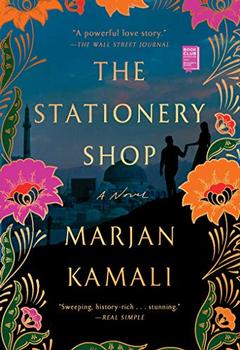Reading Guide Questions

Please be aware that this discussion guide will contain spoilers!
- The first two chapters show us very different stages in Roya's life. Discuss the similarities and differences between her life as a married woman in New England and her life as a teenager living in Tehran.
- On page 3, Roya observes, "For hadn't she married a man who was reasonable and, my goodness, unbelievably understanding? Hadn't she, in the end, not married that boy, the one she met so many decades ago in a small stationery shop in Tehran, but lassoed her life instead to this Massachusetts-born pillar of stability?" How are Bahman and Walter different? How are they similar? What do you think Roya was looking for in each of them? How do her expectations for a relationship change throughout the story?
- On page 56, after discovering Bahman's mother believes he should marry Shahla, Roya tries to contain her anger: "This was the societal web of niceties and formalities and expected good female behavior that often suffocated her. But she had no choice but to bear it, to try to navigate within it. That much she knew." Discuss the importance of "saving face" for Iranian women in the 1950s. Do those expectations differ from what was expected of American women? What about women today? Research the cultural expectations of young women in Iran and discuss as a group. How are they similar or different to the expectations you or the women in your life have experienced?
- Roya and Zari have very different personalities and ways of looking at life, and the two sisters often argue and clash. But there is a bond between them that is unbreakable. Have you experienced that simultaneous closeness and clashing with siblings in your life? What do you think it is about the sibling relationship in general and Roya and Zari's sisterhood in particular that lends itself to such contradictions?"
- Throughout the course of her courtship in 1953, Roya experiences passion and longing in new, surprising ways. For example, on page 84, when she watches Jahangir and Bahman dance, she is filled with desire. Compare Roya's desire as a young woman to Badri's. Do their social classes influence their actions? What would be the repercussions if Roya acted as Badri did in her youth?
- Marjan Kamali employs foreshadowing as a plot device in The Stationery Shop. Discuss how it adds to the story and moves the narrative along. How would the novel read without foreshadowing?
- In the 1950s, women in Tehran weren't allowed the freedoms, though still limited, that women in America were. How does Roya's family challenge those social expectations? How does that inform Roya's life as grown woman?
- In chapter 14, the readers learn about the history between Mr. Fakhri and Bahman's mother. After reading this, why do you think Badri treated Roya so terribly?
- On page 172, Roya struggles with cultural differences in flirting: "Sometimes there didn't seem to be any rules. It had been far easier in Iran where tradition and tarof who your grandfather was often dictated how to behave." How do flirting and dating in both Tehran and America challenge Roya and her expectations for relationships? Discuss the differences in how Roya and Zari approach dating. Why do you think Zari feels more comfortable in America than Roya does? Do you think Roya would have had an easier time dating in America if she had never met Bahman?
- In chapter 18, Bahman reveals the struggles of living with a mentally ill mother in Tehran. Discuss mental illness and its stigma as a group. How was mental illness viewed throughout time, and how does the treatment of the mentally ill vary across cultures? How is the way that Bahman and his father care for his mother countercultural?
- At the beginning of chapter 19, Roya and Walter go on a double date with Zari and her boyfriend, Jack. Jack offends Roya with the way he speaks about Iran and its food and culture. Do you think Roya is right in feeling offended? Would you have been offended? Discuss cultural ignorance and bias as a group.
- The characters in The Stationery Shop experience several devastating losses, from love to identity to miscarriage. How do they recover, and how do those losses forever change them? Can your group relate to these sorrows? What losses in your lives have forever changed you?
Enhance Your Book Club
- Before meeting as a group, each member should research the events of the 1953 Iranian coup d'état. Discuss your perceptions of Iran's relationship with the US before and after learning about the coup. Did this research change what you think about the history of US foreign policy? Why or why not?
- Marjan Kamali describes the food Roya, Zari, and their mother make in such beautiful detail that you feel like you can taste it through the pages. Have a dinner party where all members cook together and make dishes similar to the ones in The Stationery Shop. Discuss the sensory details of the food you make. Does the food live up to your expectations?
- The Stationery Shop has many similarities to Nicholas Sparks's The Notebook. In both novels, one set of parents disapproves of and tries to sabotage the relationship. As a group, discuss love in the context of socioeconomic class and the importance of family in choosing a life partner.
Unless otherwise stated, this discussion guide is reprinted with the permission of Gallery Books.
Any page references refer to a USA edition of the book, usually the trade paperback version, and may vary in other editions.

 Book Reviewed by:
Book Reviewed by:


